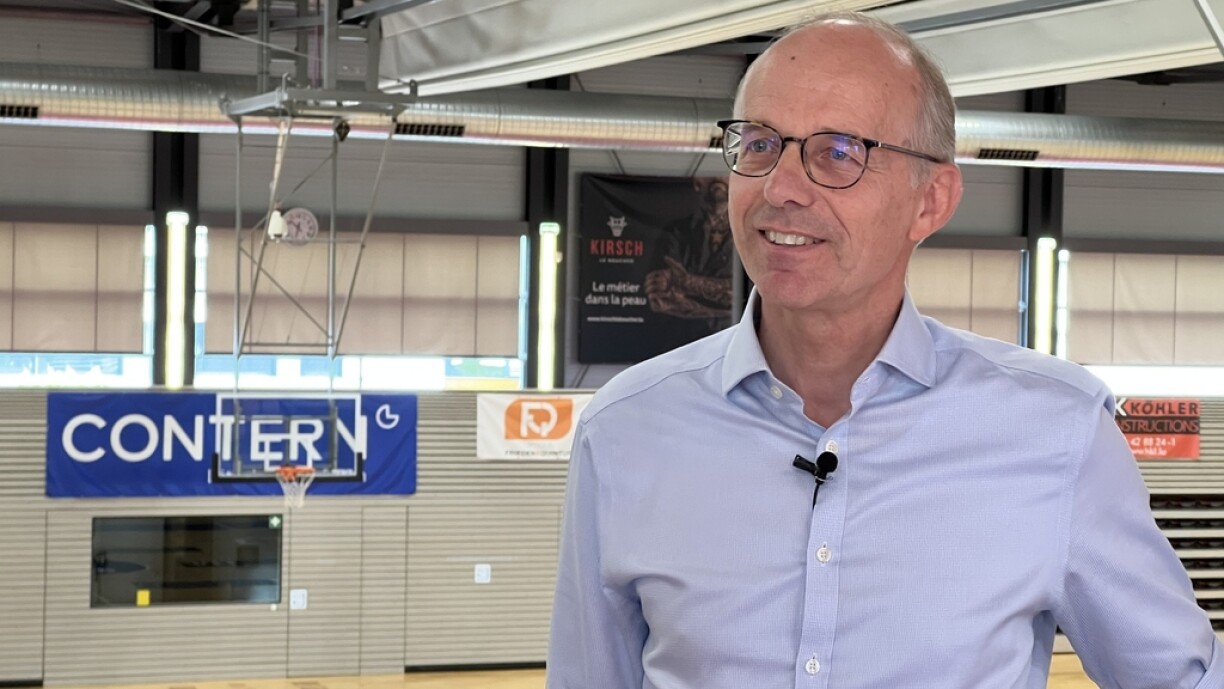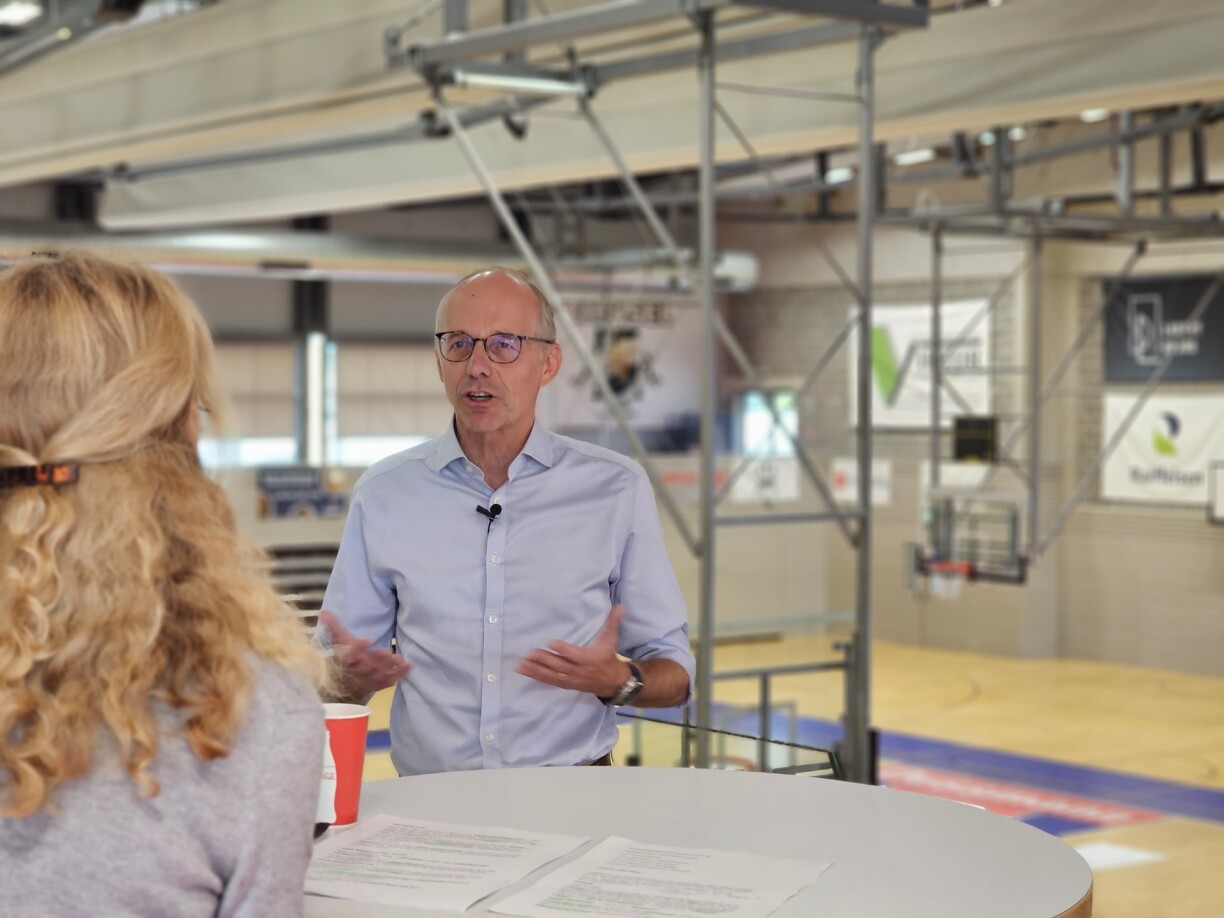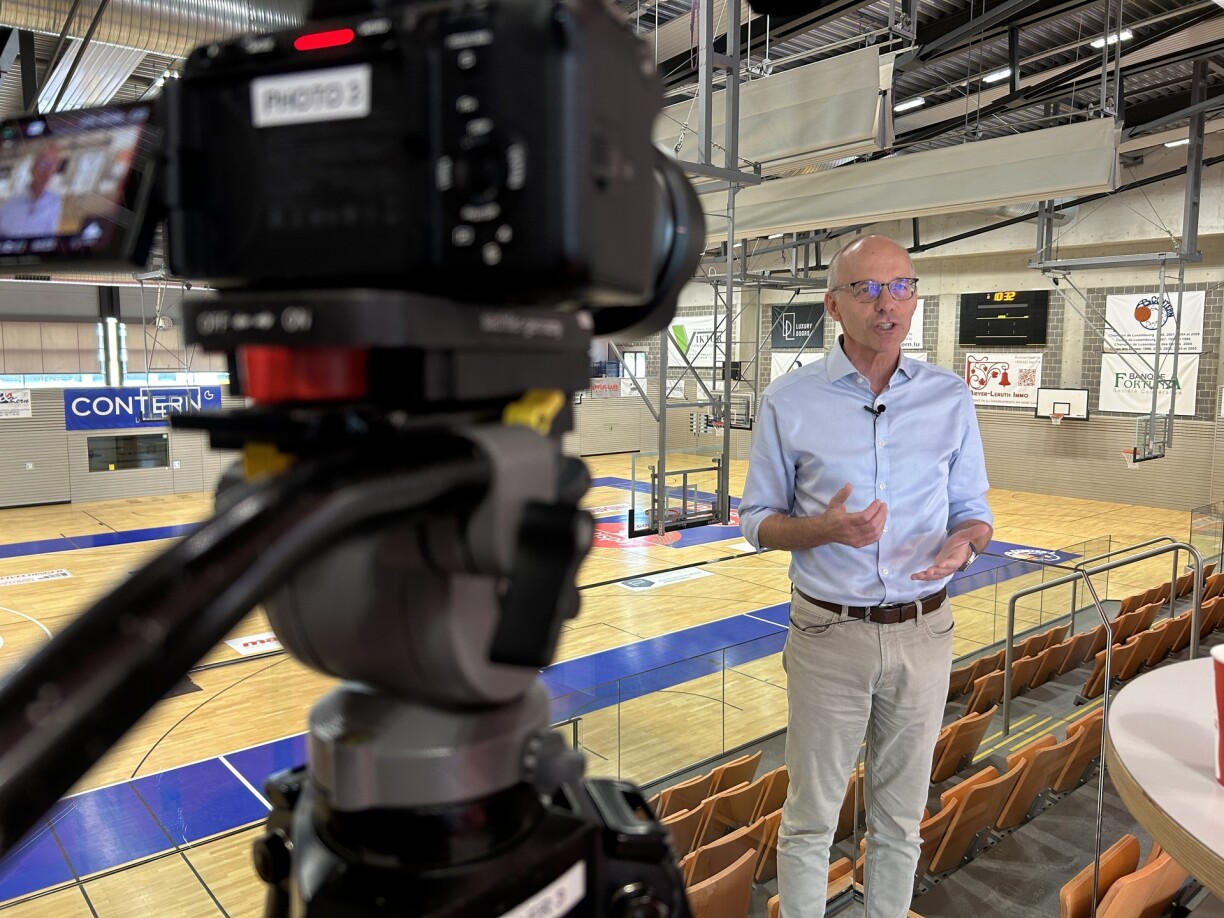
In keeping with the former finance minister’s new image, Frieden arrives for the interview at Contern sports centre wearing trainers, reflecting his efforts on social media to consciously project a more relaxed, dynamic version of himself. Throughout the interview, the CSV’s head candidate stays alert and focused, clearly enjoying his return to the political sphere, and thoughtfully considering each question before responding.
Why has he selected this particular location for the interview? Frieden explains his daughter is playing basketball at the sports centre, so he would have been sitting in the stands either way. He has always enjoyed sports, including swimming in his youth, and cycling or hiking now at the age of 59. Sport, he says, is important “for education, health and co-existence”.
Frieden is a well-known figure in Luxembourg politics. First elected as an MP in 1994, he was given a role in Jean-Claude Juncker’s cabinet in 1998, where he served first as justice minister, then defence minister, and finally Minister of Finance from 2009 to 2013.
It is likely people view him as a serious politician, he says, as in his previous political roles he never consciously showed his private side. He acknowledges this could have been a mistake. Now, times have changed, and today the CSV showcases its leading candidate as the “new” Luc. “I became a minister at only 34 years old,” he says. “Today I have much more experience I can rely on, and I can also show that I am the new Luc!”
Frieden is aware that using his first name alone should help encourage proximity to voters, but he is no Xavier Bettel, and his election campaign is unlikely to include many selfies with the electorate. However, as a candidate without an existing mandate, he will have to invest time into meeting voters and cultivating a social media presence. In person, he is more relaxed than in the past and smiles often, but otherwise, little has changed.
The former minister says he always strives to do his best - a goal he has carried with him from childhood in line with the values instilled by his teacher mother. “This is something I learned at home, which I try to implement even now in my role as a lead candidate. For me, this is part of leadership.” As head of the CSV’s election campaign, Frieden has tailored his strategy around this concept of leadership.
After the CSV exited government in the 2013 elections, Frieden joined Deutsche Bank in London instead of remaining on the opposition benches. He views this departure from politics as the right choice, saying his time away granted him new experiences and challenges instead of feeling sorry for himself. After leaving Deutsche Bank in 2016, he joined Luxembourgish law firm Elvinger Hoss Prussen and also served as President of the Luxembourg Chamber of Commerce until this year, when his party came calling once more.
A decade on, Frieden says the emphasis on environmental concerns and the fight against poverty both stand out as vital issues. The CSV agrees with the coalition parties on a number of key issues. However, they believe the Green Party has failed to expand renewable energies, and the LSAP has not considered where the budget for social benefits should come from, while the DP planned more cuts to health policies or taxes.

The promised tax reductions for everyone would virtually finance themselves through growth, Frieden says, as long as the government is more selective with benefits in future. “Not everyone should have been eligible for energy grants. People earning decent salaries should pay for their more expensive heating bills themselves, even in an energy crisis.”
It isn’t just citizens who need more purchasing power, Frieden says, but companies should also benefit from tax breaks to remain competitive. “That’s a word we don’t seem to use anymore. I’d like to stop jobs moving from Luxembourg to abroad, we need to be more attractive than our neighbours.”
Strong growth is needed to maintain Luxembourg’s high standard of living. Pensions are safe for now, he says, and instead of reform, should receive closer monitoring. “Because if not, the moment of brutal change will arrive much faster.”
Frieden dislikes the CSV being referred to as either liberal or conservative. “On an EU level, the CSV belongs to the EVP, which is a centre-right party, but in Luxembourg even the expression ‘right-wing’ is interpreted differently. For me, we are a centre party.” But if all the Grand Duchy’s major parties are centrist, how are voters meant to distinguish one from the other? Could the DP run the risk of replacing the CSV?
“In politics there is always a competition of ideas with other parties,” Frieden says. “Other parties copying ideas or styles that the CSV spent years developing, that is certainly a potential risk, but I still think it is better to go with the original over the copy.”
What is the Christian Social People’s Party’s relationship with the church in 2023? Does the “Christian” aspect play much of a role?
Frieden says: “The C does not stand for a religion, it stands for our basic values, and humanism, which is extremely important in our society.”
The CSV’s proposal to double the amount of child benefit for parents who opt to care for their children at home until they begin primary school is not an ideological suggestion, Frieden explains. The party’s policies aim to support all forms of family life, but the government should not impose rules on childcare.
Since Frieden announced his candidacy, the party’s slide in the polls has halted somewhat, but their predicted 17 seats would still represent the CSV’s worst election result in history. Frieden is aware of the challenge that lies ahead. The party’s objective, externally at least, is less about obtaining the title of prime minister, and more about returning to government from opposition.
“We would consider it a success to be the biggest party on election night, in terms of seats won. If we cannot achieve that, that would be considered a failure.”
Frieden refrains from making coalition statements, but in theory the CSV could combine with any of the other centrist parties. He calls himself a bridge-builder - a term that Bettel has also used to refer to himself. Frieden emphasises how important it is for a prime minister to clearly set the government’s course, and how this links to his concept of leadership, which he believes he could implement better than the current premier.
The CSV lead candidate says a coalition of two parties is easiest, but difficult due to the fragmented political landscape in Luxembourg.
“The fewer parties in government, the easier it is to implement a coalition programme. Three is a lot, but manageable... four would be a disaster!”
Frieden is well aware of what is at stake for the party and for his own political career. A leader must plan for success, and failure in equal measure. In the latter case, he would sit on the opposition benches in the Chamber, although he is wary of considering what it would mean for the CSV to be in opposition for another five years.
